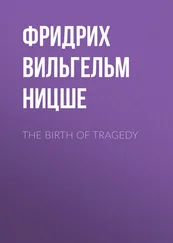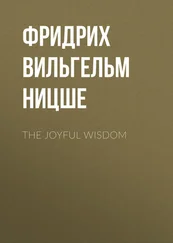487.
SHAME.—Look at that noble steed pawing the ground, snorting, longing for a ride, and loving its accustomed rider—but, shameful to relate, the rider cannot mount to–day, he is tired.—Such is the shame felt by the weary thinker in the presence of his own philosophy!
488.
AGAINST THE WASTE OF LOVE.—Do we not blush when we surprise ourselves in a state of violent aversion? Well, then, we should also blush when we find ourselves possessed of strong affections on account of the injustice contained in them. More: there are people who feel their hearts weighed down and oppressed when some one gives them the benefit of his love and sympathy to the extent that he deprives others of a share. The tone of his voice reveals to us the fact that we have been specially selected and preferred! but, alas! I am not thankful for being thus selected: I experience within myself a certain feeling of resentment against him who wishes to distinguish me in this way—he shall not love me at the expense of others! I shall always try to look after myself and to endure myself, and my heart is often filled to overflowing, and with some reason. To such a man nothing ought to be given of which others stand so greatly in need.
489.
FRIENDS IN NEED.—We may occasionally remark that one of our friends sympathises with another more than with us. His delicacy is troubled thereby, and his selfishness is not equal to the task of breaking down his feelings of affection: in such a case we should facilitate the separation for him, and estrange him in some way in order to widen the distance between us.—This is also necessary when we fall into a habit of thinking which might be detrimental to him: our affection for him should induce us to ease his conscience in separating himself from us by means of some injustice which we voluntarily take upon ourselves.
490.
THOSE PETTY TRUTHS.—“You know all that, but you have never lived through it—so I will not accept your evidence. Those ‘petty truths’—you deem them petty because you have not paid for them with your blood!”—But are they really great, simply because they have been bought at so high a price? and blood is always too high a price!—“Do you really think so? How stingy you are with your blood!”
491.
SOLITUDE, THEREFORE!—
A. So you wish to go back to your desert?
B. I am not a quick thinker; I must wait for myself a long time—it is always later and later before the water from the fountain of my own ego spurts forth, and I have often to go thirsty longer than suits my patience. That is why I retire into solitude in order that I may not have to drink from the common cisterns. When I live in the midst of the multitude my life is like theirs, and I do not think like myself; but after some time it always seems to me as if the multitude wished to banish me from myself and to rob me of my soul. Then I get angry with all these people, and afraid of them; and I must have the desert to become well disposed again.
492.
UNDER THE SOUTH WIND.—
A. I can no longer understand myself! It was only yesterday that I felt myself so tempestuous and ardent, and at the same time so warm and sunny and exceptionally bright! but to–day! Now everything is calm, wide, oppressive, and dark like the lagoon at Venice. I wish for nothing, and draw a deep breath, and yet I feel inwardly indignant at this “wish for nothing”—so the waves rise and fall in the ocean of my melancholy.
B. You describe a petty, agreeable illness. The next wind from the north–east will blow it away.
A. Why so?
493.
ON ONE’S OWN TREE.—
A. No thinker’s thoughts give me so much pleasure as my own: this, of course, proves nothing in favour of their value; but I should be foolish to neglect fruits which are tasteful to me only because they happen to grow on my own tree!—and I was once such a fool.
B. Others have the contrary feeling: which likewise proves nothing in favour of their thoughts, nor yet is it any argument against their value.
494.
THE LAST ARGUMENT OF THE BRAVE MAN.—There are snakes in this little clump of trees.—Very well, I will rush into the thicket and kill them.—But by doing that you will run the risk of falling a victim to them, and not they to you.—But what do I matter?
495.
OUR TEACHERS.—During our period of youth we select our teachers and guides from our own times, and from those circles which we happen to meet with: we have the thoughtless conviction that the present age must have teachers who will suit us better than any others, and that we are sure to find them without having to look very far. Later on we find that we have to pay a heavy penalty for this childishness: we have to expiate our teachers in ourselves, and then perhaps we begin to look for the proper guides. We look for them throughout the whole world, including even present and past ages—but perhaps it may be too late, and at the worst we discover that they lived when we were young—and that at that time we lost our opportunity.
496.
THE EVIL PRINCIPLE.—Plato has marvellously described how the philosophic thinker must necessarily be regarded as the essence of depravity in the midst of every existing society: for as the critic of all its morals he is naturally the antagonist of the moral man, and, unless he succeeds in becoming the legislator of new morals, he lives long in the memory of men as an instance of the “evil principle.” From this we may judge to how great an extent the city of Athens, although fairly liberal and fond of innovations, abused the reputation of Plato during his lifetime. What wonder then that he—who, as he has himself recorded, had the “political instinct” in his body—made three different attempts in Sicily, where at that time a united Mediterranean Greek State appeared to be in process of formation?
It was in this State, and with its assistance, that Plato thought he could do for the Greeks what Mohammed did for the Arabs several centuries later: viz. establishing both minor and more important customs, and especially regulating the daily life of every man. His ideas were quite practicable just as certainly as those of Mohammed were practicable; for even much more incredible ideas, those of Christianity, proved themselves to be practicable! a few hazards less and a few hazards more—and then the world would have witnessed the Platonisation of Southern Europe; and, if we suppose that this state of things had continued to our own days, we should probably be worshipping Plato now as the “good principle.” But he was unsuccessful, and so his traditional character remains that of a dreamer and a Utopian—stronger epithets than these passed away with ancient Athens.
497.
THE PURIFYING EYE.—We have the best reason for speaking of “genius” in men—for example, Plato, Spinoza, and Goethe—whose minds appear to be but loosely linked to their character and temperament, like winged beings which easily separate themselves from them, and then rise far above them. On the other hand, those who never succeeded in cutting themselves loose from their temperament, and who knew how to give to it the most intellectual, lofty, and at times even cosmic expression (Schopenhauer, for instance) have always been very fond of speaking about their genius.
These geniuses could not rise above themselves, but they believed that, fly where they would, they would always find and recover themselves—this is their “greatness,” and this can be greatness!—The others who are entitled to this name possess the pure and purifying eye which does not seem to have sprung out of their temperament and character, but separately from them, and generally in contradiction to them, and looks out upon the world as on a God whom it loves. But even people like these do not come into possession of such an eye all at once: they require practice and a preliminary school of sight, and he who is really fortunate will at the right moment also fall in with a teacher of pure sight.
Читать дальше











